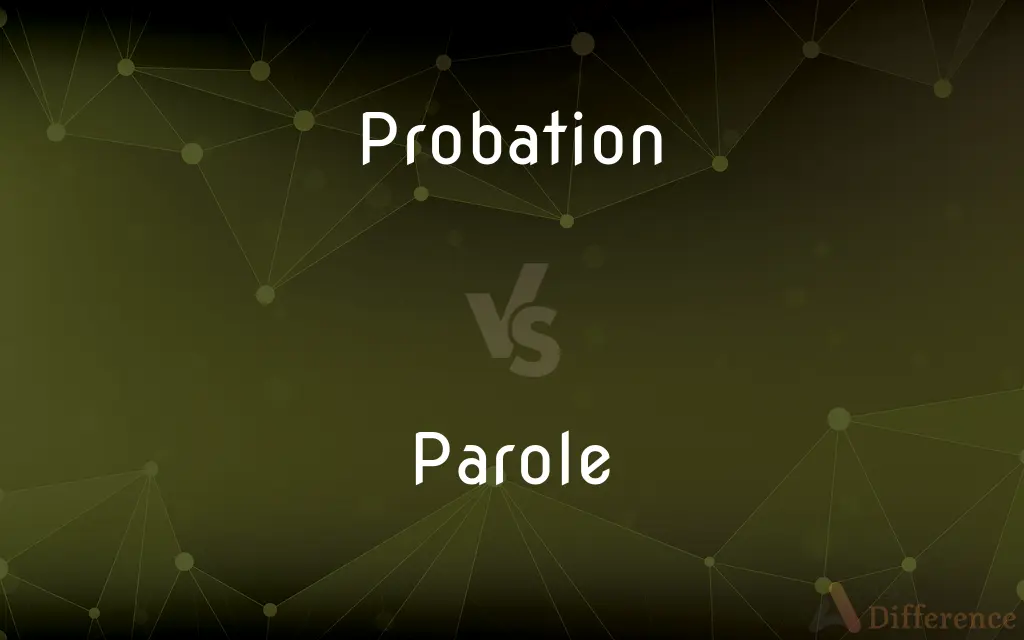Probation vs. Parole — What's the Difference?
By Tayyaba Rehman & Urooj Arif — Updated on April 17, 2024
Probation is court-ordered supervision in the community, instead of prison time; parole is conditional release from prison after serving part of a sentence.

Difference Between Probation and Parole
Table of Contents
ADVERTISEMENT
Key Differences
Probation is a sentencing alternative that allows offenders to remain in the community under court supervision, typically instead of serving time in prison. Whereas, parole is granted after an offender has served a portion of their prison sentence, allowing them to complete their sentence under supervision in the community.
Offenders on probation may not have served time in prison and are often given probation as part of a plea deal or sentencing. On the other hand, parolees have usually served part of their prison sentence and are released early for good behavior or other reasons.
Probation conditions can include meeting regularly with a probation officer, maintaining employment, and avoiding further legal trouble. Meanwhile, parole also includes conditions such as checking in with a parole officer, adhering to curfews, and sometimes living in approved residences.
Violations of probation can lead to stricter conditions being imposed or the original prison sentence being enforced. Conversely, parole violations can result in being sent back to prison to serve the remainder of the original sentence or even longer.
Probation is typically managed by state or local judicial systems, emphasizing alternative sentencing and rehabilitation. Parole, however, is generally managed by state or federal parole boards, which focus on reintegrating the offender into society after imprisonment.
ADVERTISEMENT
Comparison Chart
Definition
Supervision instead of prison
Conditional release from prison
Basis of Assignment
As part of initial sentencing
After serving part of a prison sentence
Management
Typically by state or local judicial systems
Often by state or federal parole boards
Conditions
Regular meetings, employment, legal compliance
Check-ins, curfews, approved residence
Consequences of Violation
Stricter conditions or prison
Return to prison to serve remaining sentence
Compare with Definitions
Probation
An alternative to incarceration.
Probation was chosen to reduce the overcrowded prison system.
Parole
A method to reduce prison population and costs.
Parole helps manage the costs associated with high inmate populations.
Probation
A period of critical observation and evaluation.
During probation, his activities were closely monitored by a probation officer.
Parole
The release of a prisoner temporarily for a special purpose or permanently before the completion of a sentence, on the promise of good behavior.
After serving ten years, Mark was granted parole.
Probation
A sentence allowing a person found guilty of an offense to remain in the community under conditions.
John was sentenced to three years of probation instead of prison time.
Parole
The conditional freedom granted to an offender.
His parole conditions required him to meet his parole officer twice a month.
Probation
A form of judicial leniency aimed at rehabilitation.
Probation reflects the court's belief in the possibility of rehabilitation outside of jail.
Parole
A system for the supervised freedom of offenders.
Parole is designed to ease the integration of former prisoners into the community.
Probation
A judicial means of imposing restrictions.
His probation conditions included a curfew and community service.
Parole
A post-incarceration monitoring tool.
Parole serves as a bridge between prison life and full reintegration into society.
Probation
Probation in criminal law is a period of supervision over an offender, ordered by the court instead of serving time in prison. In some jurisdictions, the term probation applies only to community sentences (alternatives to incarceration), such as suspended sentences.
Parole
Parole is the early release of a prisoner who agrees to abide by certain conditions, originating from the French word "parole" ("speech, spoken words" but also "promise"). The term became associated during the Middle Ages with the release of prisoners who gave their word.
Probation
A process or period in which a person's fitness, as for work or membership in a social group, is tested.
Parole
Early release of a prisoner who is then subject to continued monitoring as well as compliance with certain terms and conditions for a specified period.
Probation
A criminal sentence consisting of a term of imprisonment that is suspended provided certain terms and conditions are met.
Parole
The duration of such conditional release.
Probation
The status of serving such a criminal sentence.
Parole
A password used by an officer of the day, an officer on guard, or the personnel commanded by such an officer.
Probation
Release of a person from commitment for insanity, subject to reversal in the event of a relapse into insanity.
Parole
Word of honor, especially that of a prisoner of war who is granted freedom only after promising not to engage in combat until formally exchanged.
Probation
A trial period in which a student is given time to try to redeem failing grades or bad conduct.
Parole
(Linguistics) The act of speaking; a particular utterance or word.
Probation
A period of time when a person occupies a position only conditionally and may easily be removed for poor performance
You'll be on probation for first six months. After that, if you work out, they'll hire you permanently.
Parole
To release (a prisoner) on parole.
Probation
(legal) A type of sentence where convicted criminals are allowed to continue living in the community but will automatically be sent to jail if they violate certain conditions
He got two years probation for robbery.
Parole
Originally, one's oath or word of honour, given as a condition of release from custody; now specifically, describing the release of a former prisoner under certain conditions, especially the promise of good behaviour.
He will be on parole for nearly two more years.
He was released on parole.
Probation
A testing period of time
Parole
Conditional release of a prisoner (now especially before the end of a custodial sentence), or the term or state of such release; the system governing such releases.
The defendant shall be sentenced to life without the possibility of parole.
Probation
(archaic) The act of testing; proof
Parole
A word of honor, especially given by a prisoner of war, to not engage in combat if released.
Probation
The act of proving; also, that which proves anything; proof.
When by miracle God dispensed great gifts to the laity, . . . he gave probation that he intended that all should prophesy and preach.
Parole
A watchword or code phrase; military a password given only to officers, distinguished from the countersign, which is given to all guards.
Probation
Any proceeding designed to ascertain truth, to determine character, qualification, etc.; examination; trial; as, to engage a person on probation.
No [view of human life] seems so reasonable as that which regards it as a state of probation.
Parole
(linguistics) Language in use, as opposed to language as a system.
Probation
A trial period during which your character and abilities are tested to see whether you are suitable for work or for membership
Parole
The permission for a foreigner who does not meet the technical requirements for a visa to be allowed to enter the U.S. on humanitarian grounds.
Probation
A trial period during which an offender has time to redeem himself or herself
Parole
(legal) parol
Probation
(law) a way of dealing with offenders without imprisoning them; a defendant found guilty of a crime is released by the court without imprisonment subject to conditions imposed by the court;
Probation is part of the sentencing process
Parole
To release (a prisoner) on the understanding that s/he checks in regularly and obeys the law.
Parole
A word; an oral utterance.
Parole
Word of promise; word of honor; plighted faith;
This man had forfeited his military parole.
Parole
A watchword given only to officers of guards; - distinguished from countersign, which is given to all guards.
Parole
Oral declaration. See 1st Parol, 2.
Parole
The release of a prisoner from confinement prior to the end of the original sentence, conditioned on good behavior and often with other specific conditions, such as not to associate with known criminals. Such early release is common where the sentence provides a minimum and maximum term; as, he was released on parole after three years of his five-year sentence; he is out on parole.
Parole
A document authorizing a parole{5}.
Parole
See 2d Parol.
Parole
To set at liberty on parole; as, to parole prisoners.
Parole
A promise;
He gave his word
Parole
A secret word or phrase known only to a restricted group;
He forgot the password
Parole
(law) a conditional release from imprisonment that entitiles the person to serve the remainder of the sentence outside the prison as long as the terms of release are complied with
Parole
Release a criminal from detention and place him on parole;
The prisoner was paroled after serving 10 years in prison
Common Curiosities
What is parole?
Parole is the conditional release of a prisoner before the completion of their sentence, under the promise of good behavior.
How are probation and parole similar?
Both probation and parole involve supervision in the community and require the offender to adhere to certain conditions.
What is probation?
Probation is a court-ordered sanction that allows a person convicted of a crime to remain in the community under supervision instead of going to prison.
Who oversees parole?
Parole is usually managed by a parole board, which can be state or federal.
What happens if parole is violated?
Violating parole can lead to a return to prison to serve the remainder of the sentence.
Who oversees probation?
Probation is typically overseen by state or local judicial systems.
What are common conditions of parole?
Parole conditions often include reporting to a parole officer, adhering to a curfew, and living in an approved residence.
What are common conditions of probation?
Common probation conditions include regular check-ins with a probation officer, maintaining employment, and avoiding criminal activity.
Can probation be revoked?
Yes, probation can be revoked for violations of its conditions, potentially leading to imprisonment.
Is probation a part of the initial sentencing?
Yes, probation is often decided during the initial sentencing phase as an alternative to imprisonment.
Share Your Discovery

Previous Comparison
Plan vs. Setout
Next Comparison
Amess vs. MessAuthor Spotlight
Written by
Tayyaba RehmanTayyaba Rehman is a distinguished writer, currently serving as a primary contributor to askdifference.com. As a researcher in semantics and etymology, Tayyaba's passion for the complexity of languages and their distinctions has found a perfect home on the platform. Tayyaba delves into the intricacies of language, distinguishing between commonly confused words and phrases, thereby providing clarity for readers worldwide.
Co-written by
Urooj ArifUrooj is a skilled content writer at Ask Difference, known for her exceptional ability to simplify complex topics into engaging and informative content. With a passion for research and a flair for clear, concise writing, she consistently delivers articles that resonate with our diverse audience.















































